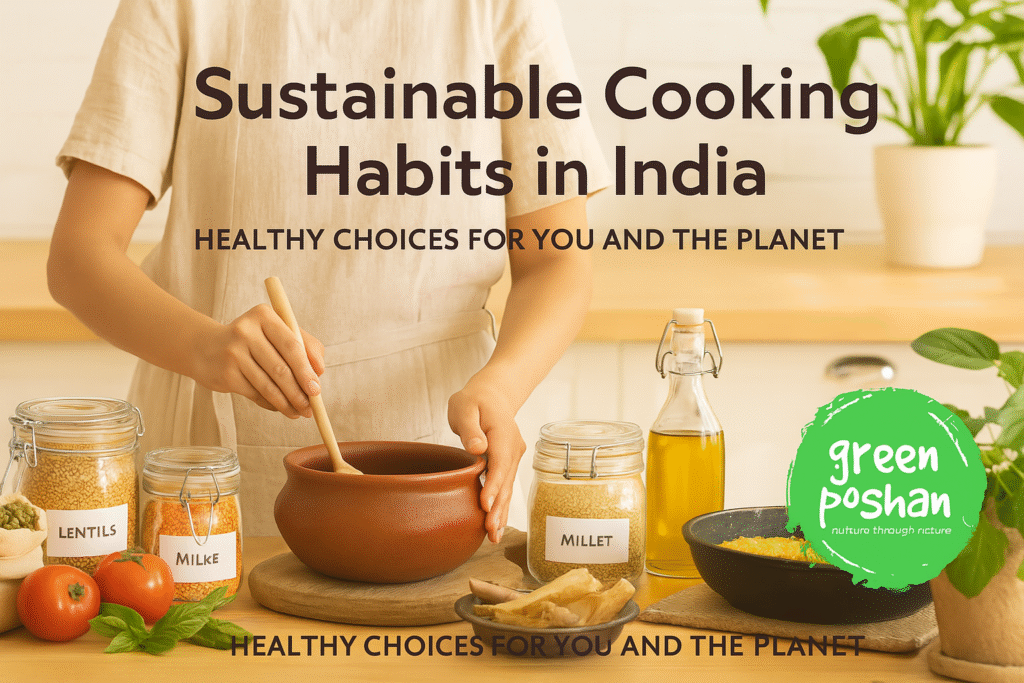As India’s food culture evolves, our kitchens have become a reflection of changing lifestyles – fast, convenient, and often wasteful. But now, there’s a growing awareness to return to sustainable cooking habits, focusing on mindful eating and eco-friendly practices.
Cooking sustainably doesn’t require expensive changes. It’s about choosing natural ingredients, reducing waste, and cooking with care for both our health and the environment. Small shifts in how we cook and what we cook with can make a lasting difference for future generations.
1. Understanding Sustainable Cooking
Sustainable cooking is about making choices that are good for you and gentle on the planet. It involves:
- Using locally grown, seasonal produce.
- Minimizing food waste.
- Cooking with natural, chemical-free ingredients.
- Reducing dependency on processed or imported foods.
In essence, it’s about balancing nourishment and nature – ensuring that every meal leaves a lighter footprint on the Earth.
2. Use Locally Sourced and Traditional Ingredients
India’s strength lies in its diversity of local crops – millets, pulses, spices, and grains that thrive in our soils. Sourcing food locally reduces carbon emissions from transport and supports regional farmers.
Traditional Indian grains like foxtail millet, rajgira, and Khapli wheat are naturally suited to our climate, making them both sustainable and health-friendly. By using ingredients that don’t rely on heavy processing or long-distance shipping, you contribute to a healthier ecosystem.
This aligns beautifully with brands promoting farm-to-table purity – a model where every product supports both farmers and conscious consumers.
3. Reduce Food Waste Through Smart Planning
Food waste is one of the biggest environmental challenges in India. You can minimize it with small, practical steps:
- Plan meals ahead to avoid overbuying.
- Repurpose leftovers creatively – yesterday’s dal can become today’s paratha stuffing.
- Store grains and flours properly to extend shelf life.
- Compost vegetable peels and fruit scraps to enrich soil.
These mindful habits not only reduce waste but also teach a deeper respect for food and nature.
4. Cook with Traditional, Energy-Efficient Methods
Indian cooking traditions are inherently sustainable. Using clay pots, iron pans, and slow-cooking methods preserves nutrients and enhances flavor while consuming less energy.
Pressure cooking, for instance, saves fuel and retains nutrients better than frying or baking. Similarly, steaming vegetables instead of boiling them reduces nutrient loss.
Whenever possible, avoid non-stick cookware that releases toxins under high heat – opt for cast iron, stainless steel, or earthenware instead.
5. Choose Chemical-Free Oils and Spices
A major part of sustainable cooking is knowing what goes into your food. Cold-pressed oils and naturally processed spices not only enhance health but also reduce industrial pollution caused by chemical refining.
Chemical-free food products – such as stone-ground flours, pure ghee, and unpolished pulses – maintain traditional integrity and ensure that your meals remain wholesome from source to serving.
Sustainable cooking is about staying close to nature, both in flavor and in process.
6. Make Eco-Friendly Kitchen Choices
Beyond ingredients, the tools and practices you use in the kitchen matter:
- Replace plastic storage with glass or steel containers.
- Use reusable cloth bags instead of single-use plastic.
- Save cooking water to water plants.
- Switch to energy-efficient stoves or induction cooktops.
These small, conscious steps help create an eco-friendly kitchen that reflects responsibility and care.
7. Teach Sustainability Through Food
Sustainable cooking is also about creating awareness. Involve children and family members in food preparation – teach them why wasting food matters or how to differentiate between natural and processed ingredients.
This generational transfer of mindful habits ensures that sustainability becomes a way of life, not a temporary choice.
Wrapping Up
Building sustainable cooking habits in India is not about perfection – it’s about intention. Each choice you make in your kitchen – from sourcing ingredients to managing waste – shapes a healthier planet and a healthier you.
By returning to traditional cooking methods and natural ingredients, we preserve India’s culinary heritage while protecting the Earth. When food is pure and consciously prepared, it nourishes both body and soul.
So cook with purpose, eat with gratitude, and remember – sustainability begins in your kitchen.





